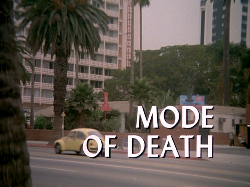Mode of Death (Quincy, M.E.)
| Mode of Death | ||||||||||||||||||||||||||||||||||||||
|---|---|---|---|---|---|---|---|---|---|---|---|---|---|---|---|---|---|---|---|---|---|---|---|---|---|---|---|---|---|---|---|---|---|---|---|---|---|---|

| ||||||||||||||||||||||||||||||||||||||
|
Episode Quote
"You can’t just list the chemicals and call it mystery solved — sometimes you have to understand the man behind the bottle." ~ Dr. Quincy, in Mode of Death (Quincy, M.E.)
Episode Overview
Mode of Death (Season 5, Episode 7) aired on NBC on November 1, 1979. Dr. Quincy investigates the apparent suicide of an evangelist whose church faces a federal inquiry. Initial toxicology and crime scene suggest self-inflicted death, but Quincy suspects deeper questions, prompting a psychological autopsy to determine foul play or accident :contentReference[oaicite:0]{index=0}.
Table of Contents
Application of The QME Episode Laws
Mode of Death exemplifies the **QME Episode Laws**:
- ✅ **Law 1:** Quincy seeks truth beyond toxicology, pursuing justice whether victim or suspect.
- ✅ **Law 2:** The episode explores institutional challenge—religion under government scrutiny and media pressure.
- ✅ **Law 3:** Tackles complex issues—faith, substance abuse, psychological trauma—with respect.
- ✅ **Law 4:** Uses scientific and psychological autopsy, showcasing realistic forensic thought processes :contentReference[oaicite:1]{index=1}.
Episode Synopsis
An unnamed evangelist is found dead in a motel room with alcohol and prescription drug paraphernalia. The church is under government investigation for financial and organizational impropriety. Quincy is pressured to rule a suicide quickly, but low drug levels and inconsistent evidence prompt him to order a psychological autopsy. Teaming with Dr. Asten, they review the man's sermons, stressors, and inner turmoil. Suspected motives emerge—including blackmail threats and emotional instability tied to the church scandal.
Quincy uncovers hidden panic and suicidal ideation, or possibly signs of covert foul play meant to look like self-harm. The episode ends ambiguously, framing the "mode of death" not just as cause but context: a portrait of mental collapse amidst religious and media pressure.
Plot Summary
A motel room death initially flagged as suicide leads Quincy to question assumptions. Toxicology is inconclusive. He enlists a psychological autopsy, reconstructing victim’s mind through interviews and sermon archives. While the coroner’s office debates suicide vs. murder, refugee evidence of blackmail and stress point to possible homicide or collateral death. Quincy’s methodical breakdown of mental health redefines forensic boundaries.
← S05E06 – "Sweet Land of Liberty" • Mode of Death • S05E08 – "Nowhere to Run"
Season 5 Overview: Full Episode List
Main Cast
- Jack Klugman as Dr. R. Quincy
- Robert Ito as Sam Fujiyama
- John S. Ragin as Dr. Robert Asten
- Val Bisoglio as Danny Tovo
- Garry Walberg as Lt. Monahan
- Joseph Roman as Sgt. Brill
Guest Cast
- Sarah Rush as Evangelist’s wife
- Stephen Elliott as Psychological autopsy expert
- Plus Marshall Thompson, Byron Morrow, Irene Tedrow, William Bogert, Granville Van Dusen, Regis Cordic, Fritzi Burr, Ron Ellis
Case File Summary
Victim: Prominent Evangelist (name undisclosed) Case #: LACC 79.11.031
Found dead in motel; preliminary findings ambiguous. Psychological autopsy ordered after physical analysis inconclusive. Investigation delves into mental state, stressors, and possible third-party motives tied to church scandal.
Additional Victims
- None — this is a single-victim case focused on cause versus context.
Alleged Perpetrator(s)
- Unnamed individuals linked to church investigation, potential instigators of intimidation.
- Death remains ambiguous—could be self-inflicted or induced through psychological manipulation.
Filming Locations and Exterior Footage
Standard Los Angeles interiors with motel set and office scenes filmed on soundstages, including coroner’s lab featured throughout the series.
Forensic Science Insight
- Demonstrates psychological autopsy—analyzing diaries, mental health, behavior under stress.
- Illustrates forensic restraint: distinguishing between physiological cause and psycho-social context.
- Highlights importance of multidisciplinary forensic teams (medical examiners + psychologists).
Themes & Tropes
- Psychological Autopsy — rare on television, central to plot.
- Institution Under Fire — church vs. state tension.
- Media Scrutiny — societal pressure to conclude before full facts.
- Ambiguous Death — challenges binary homicide vs. suicide narrative.
Reception & Ratings
Critically noticed for its unusual forensic focus: psychological analysis over physical evidence. Reviews acknowledge it as groundbreaking in applying mental health science to crime investigation.
Trivia
- One of few QME episodes to use psychological autopsy as main tool.
- Episode title refers both to forensic term and moral ambiguity.
Cultural Impact
Pioneered forensic psychology in TV crime drama, influencing later series that integrated victim profiling and mental health aspects into investigative arcs.
